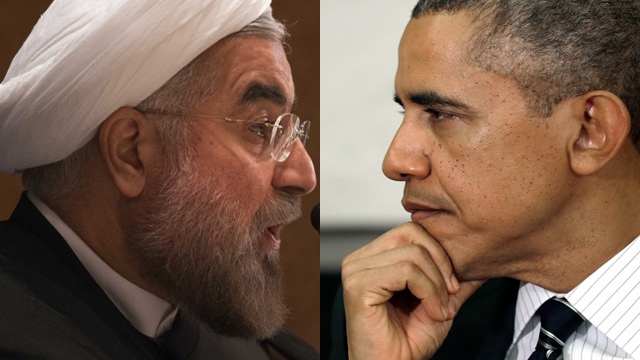On 24 November 2013, the signing of the Geneva nuclear deal has been considered from many quarters as the beginning of detente between the United States and the Islamic Republic of Iran. Security-wise, the interests of Washington and Tehran may well return to be attuned as they used to be until 1979 and the Iranian exit from the Central Treaty Organization. Geopolitically, the two nations are natural allies and the animosity that has characterized their relations in the last three decades is to be attributed exclusively to ideological motivations.
The letter that the Ayatollah Ruhollah Khomeini addressed to the President of the Soviet Union, Mikhail Gorbachev, dating back to 7 January 1989, is illustrative of the self-perception of the mission that Islamic Republic has to accomplish in history.
Khomeini argued that communism fell short of the task to confront the Western imperialism embodied by the United States due to its materialistic and atheistic tenets, which were the ultimate causes of the collapse being undergone by the Soviet Union. Conversely, the Islamic Republic of Iran, “as the greatest and most powerful base of the Islamic world,” was destined to succeed where communism had failed. Khomeini’s message turned out to be extraordinarily farsighted, as the demise of the Berlin wall and of the Soviet empire occurred within a few months. His letter to Gorbachev hence marked the handover to the Islamic Republic of the world leadership in the fight against the West.
Therefore, the roots of the enmity that transformed the United States from an ally into the arch-foe to be defeated are deeply grounded in the Cold War and refer to a preconceived and often unconscious hostility against the West that needs to be overcome if an actual reconciliation is supposed to take place between Tehran and Washington.
On the other hand, Khomeini−by identifying in the “lack of belief in spirituality” and the “absence of true faith in God […] the very problem that has dragged, or will drag, the West to vulgarism and an impasse”−was, again, extraordinarily farsighted in depicting the situation in which the Western world finds itself today. In such respect, political Islam poses an ethical and philosophical challenge that the West should not evade. The Muslim thought reacted to the hyper-secularization stemming from both the United States and Europe by absolutizing the function of Islam to the maximum. The result has been an excess of religion in the public sphere, with the creation of an enormous rift between the Muslim world and the hyper-secularized West that transcends the simplistic argument of the separation between politics and religion, and requires to be bridged.
For this reason, the process of rapprochement between US and Iran in the security field should be complemented with an official, extensive and mutually beneficial dialogue pertaining the broader cultural domain, open to other Muslim and non-Muslim countries, and aimed at drawing the two poles closer in terms of vision of the world and society. If the two poles continue to remain so far away from each other, any agreement or understanding as to the security of the Greater Middle East and the international community at large, will correspond to merely tactical moves, ensuring ephemeral stability in the short term, but not a true and permanent peace.
Firstly, arms should be laid down intellectually and, from this point of view, Tehran should make a step forward. The West has demonstrated to have fully accepted the very existence of the Islamic Republic of Iran and its “rightful place in the community of nations,” as declared by Barack Obama. It is time for the Iranian leaders to follow suit. The pledge to establish relations with the United States based on a “constructive engagement […] mutual respect and common interest,” taken by the new President, Hassan Rouhani, before the UN General Assembly, is expected to be the long-awaited beginning of an authentic détente between Tehran and Washington.








